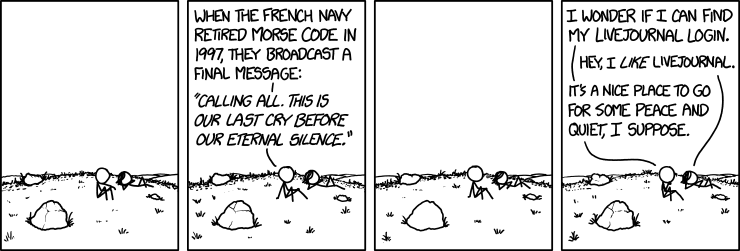Morse Code

Oh, because Facebook has worked out SO WELL for everyone.

Oh, because Facebook has worked out SO WELL for everyone.
Cueball recounts the last message sent in morse code by the French maritime radio station Le Conquet radio upon retiring its 500 kHz channel.
The poetic, and potentially angsty-sounding nature of the message reminds him of the on-line journal website LiveJournal, which was popular until the late 2000s (it was launched in 1999), and stereotypically used by angst-ridden teenagers to post song lyrics, poems, or cryptic messages to express their emotions and possibly fish for attention. Since Cueball never uses his LiveJournal account any more, he wonders if he can find the password again. He might be considering posting the final Morse Code message as his own last and final message on his LiveJournal.
The popularity of the site died down considerably with the arrival of social networking sites like MySpace, Facebook, Google Plus and the advent of microblogging platforms like Twitter and Tumblr. LiveJournal has also lost a lot of users since a Russian company bought them out; Russian dissidents used LiveJournal to present their opinions, and the Russian government used to retaliate by creating "denial of service" attacks which make LiveJournal unusable for all its users, sometimes for days. Nowadays (May 2014) LiveJournal is still quite popular among Russian-speaking people, including dissenters, but its administration was forced to show HTTP 451 error in some cases (e. g., when a user with a Russian IP is trying to read Alexei Navalny blog) with new laws. Thus when Megan is upset with his desire to let LiveJournal die out like the Morse Code, Cueball describes it as "a nice place to go for some peace and quiet".
The title text is Megan's (or Randall's) sarcastic remark indicating that Facebook is no less filled with angst-ridden thoughts than LiveJournal was, nor is it free from problems or controversies around other issues such as security or privacy.